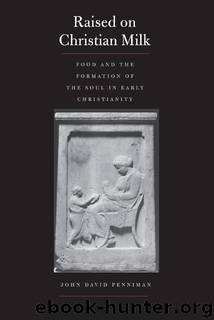Raised on Christian Milk by John David Penniman

Author:John David Penniman
Language: eng
Format: epub
ISBN: 9780300222760
Publisher: Yale University Press
SIX
Milk Without Growth
Augustine and the Limits of Formation
We should drink, not think.
—Augustine, Sermon 119
You are neither a child of the gods, nor born from divine blood, you faithless one; you were brought forth from the uneven crags of a rock, and wild tigers raised you on the milk of their breasts.
—Virgil, Aeneid
ROME’S FIRST HERO was no poster child for the family values that later defined the empire. In the Aeneid, Virgil dramatizes the moment Aeneas leaves Dido, recounting the curse that the queen hurls at her betrayer. Having been unjustly abandoned by Aeneas, Dido declares that such a dishonorable man could not have been born or nourished by noble parents. No virtuous, well-born man would behave this way, she seethes. He must have been reared in the wild, birthed from the cleft of a mountain, suckled by wild beasts. As with the twins Romulus and Remus, the great hero of Rome must have been a feral child.
The link between Aeneas’s deficient character and the savage milk on which he was nursed evokes, albeit with literary subtlety, the discourse I have been analyzing that surrounded the role of proper nourishment in the formation of children in the early Roman Empire. The subtlety of this theme, however, is drawn out explicitly some four hundred years later in Macrobius’s Saturnalia.1 Composed in the form of a quirky repository of Roman culture, the Saturnalia is presented as a dialogue in which the interlocutors are “enthusiasts of old learning, anxious to keep alive the old traditions.”2 Whether or to what extent Macrobius was himself invested in a project of cultural retrieval is unclear. But the archival quality of his work has the effect of foregrounding crucial elements of romanitas that had persevered into “the long fifth century.”3
The image of Aeneas being suckled by tigers prompts Macrobius to consider the importance of breast milk in crafting a person’s character. In so doing, the Saturnalia catalogs the enduring power of nourishment that had been crucial to the ideology of the early empire:
[I]n implanting one’s character a large role is generally played by the qualities of one’s nurse and the nature of the milk received, which enters the tender babe and mingles with the parents’ seed when it is still fresh, as the two-fold mixture shapes a single nature. That is why a provident nature caused the capacity of nursing to coincide with the delivery itself, so that the very act of nurturing would make children and parents resemble each other. For after the blood, like a craftsman, has shaped the body’s every nook and cranny and fed it, the same blood rises to the upper regions of the mother’s body as the delivery approaches and takes on the nature of white milk, so that it might nurture the new-born as it had previously crafted it. That is why it is correctly believed that milk’s innate properties have the same capacity as seed’s natural force to produce a likeness of body and minds.4
Dido’s reference to the tiger’s milk
Download
This site does not store any files on its server. We only index and link to content provided by other sites. Please contact the content providers to delete copyright contents if any and email us, we'll remove relevant links or contents immediately.
The Gnostic Gospels by Pagels Elaine(2532)
Jesus by Paul Johnson(2363)
Devil, The by Almond Philip C(2333)
The Nativity by Geza Vermes(2233)
The Psychedelic Gospels: The Secret History of Hallucinogens in Christianity by Jerry B. Brown(2158)
Forensics by Val McDermid(2094)
Going Clear: Scientology, Hollywood, and the Prison of Belief by Lawrence Wright(1985)
Going Clear by Lawrence Wright(1968)
Barking to the Choir by Gregory Boyle(1822)
Old Testament History by John H. Sailhamer(1818)
Augustine: Conversions to Confessions by Robin Lane Fox(1774)
The Early Centuries - Byzantium 01 by John Julius Norwich(1746)
A History of the Franks by Gregory of Tours(1729)
A Prophet with Honor by William C. Martin(1728)
Dark Mysteries of the Vatican by H. Paul Jeffers(1723)
The Bible Doesn't Say That by Dr. Joel M. Hoffman(1682)
by Christianity & Islam(1636)
The First Crusade by Thomas Asbridge(1611)
The Amish by Steven M. Nolt(1575)
